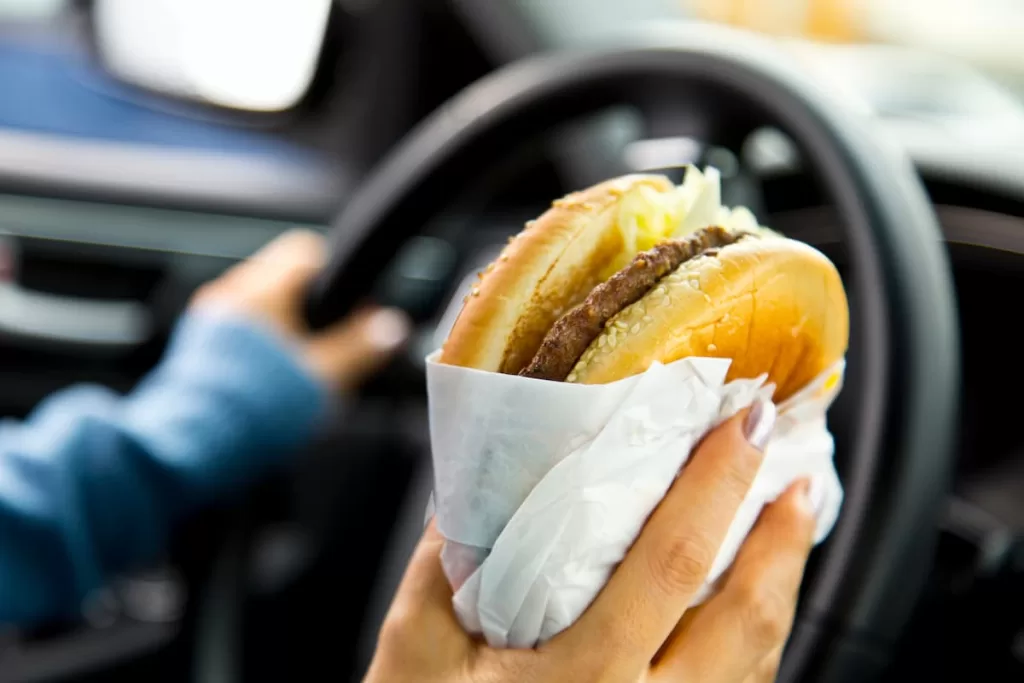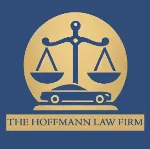Eating while driving can be extremely dangerous and lead to serious car accidents. Here’s what you can do to prioritize your safety and lower your risk of a car accident.

Since the introduction of drive-throughs in 1948 and their widespread adoption by restaurants throughout the 1970s, buying food on the go has become a part of the American way of life. However, as convenient as it may be, eating while driving can be extremely dangerous and can lead to serious consequences.
In this article, we’ll discuss the dangers of eating while driving and why it’s important to prioritize your safety on the road.
What Are the Hazards of Eating While Driving?
Unfortunately, eating while driving can be just as distracting and dangerous as using your phone or sending a text message. Let’s take a closer look at the three main types of distractions that come with eating while driving and why it’s so important to avoid them.
Visual Distraction
The first type of distraction caused by eating while driving is visual distractions. This happens when your eyes are taken off the road for an extended period of time to find something to eat or drink, reach for food, or simply look at what you are about to consume. Visual distraction can cause you to miss important traffic signals and hazards on the road, thus putting you and others road users in serious danger should an emergency situation arise.
Manual Distraction
In addition to visual distraction, eating while driving can also cause manual distraction. This is where the driver must take one or both of their hands off the wheel in order to eat or drink.
Even the seemingly simple manual distractions such as unwrapping or opening a food or drink item can cause you to drift from lanes and accelerate and brake erratically. These actions can put you at an increased risk of a car accident.
Cognitive Distraction
Cognitive distraction occurs when you focus more on eating than on driving and can lead to a decrease in reaction time and decision-making abilities. This can be especially dangerous when quick reactions are necessary, such as changing lanes or avoiding obstacles on the road.
How Can You Prove The Other Driver Was Eating While Driving?
If you saw the other driver eating moments before the accident happened, there are several ways that you can prove that they were eating while driving. Here are some of them:
- Police report: If the police responded to the accident, they might have noted in their report if the other driver was seen eating or if food was found in their vehicle.
- Receipts: If the driver purchased food around the time of the accident, receipts may be able to prove that they were eating while driving.
- Photos from the scene: If you took photos of the accident scene, these may be able to show evidence of the other driver eating while driving. This could include food wrappers or containers in the car, or even food on the driver’s clothing.
- Surveillance footage: If the accident occurred near a store or other location with surveillance cameras, footage from these cameras may be able to show the other driver eating while driving.
St. Louis Car Accident Lawyer
If you have been involved in a St. Louis car accident due to the negligence of another driver, our experienced St. Louis car accident attorneys are here to help. We have 25 years of experience and a proven track record of success in obtaining compensation for car accident victims in St. Louis, Missouri. Call us 24/7 for a free case evaluation.
Why Choose Us vs TV Lawyers?
Direct Attorney Access
Maximum Settlement Focus
Trial-Ready Cases
Paralegal Handling
Quick Settlement Push
Settlement-Only Focus
Free Consultation with a St. Louis Car Accident Lawyer
Don’t talk to an insurance claims adjuster before speaking with The Hoffmann Law Firm, L.L.C. We can help you avoid making statements that may affect the outcome of your case. The consultation is free; you don’t pay unless we get you money!
